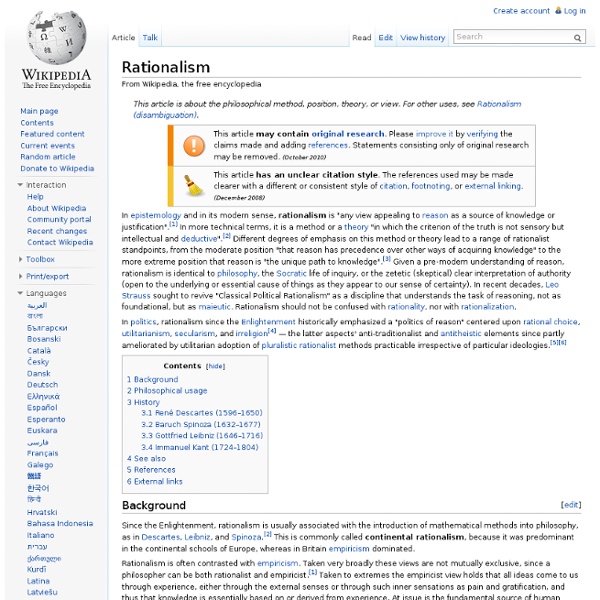Rationalism

http://en.wikipedia.org/wiki/Rationalism
Related: Teorias da Aprendizagem
• -
Rationalism vs. Empiricism
1. Introduction The dispute between rationalism and empiricism takes place within epistemology, the branch of philosophy devoted to studying the nature, sources and limits of knowledge. The defining questions of epistemology include the following. What is the nature of propositional knowledge, knowledge that a particular proposition about the world is true? To know a proposition, we must believe it and it must be true, but something more is required, something that distinguishes knowledge from a lucky guess.
Rationalism - By Movement / School
Rationalism is a philosophical movement which gathered momentum during the Age of Reason of the 17th Century. It is usually associated with the introduction of mathematical methods into philosophy during this period by the major rationalist figures, Descartes, Leibniz and Spinoza. The preponderance of French Rationalists in the 18th Century Age of Enlightenment, including Voltaire, Jean-Jacques Rousseau and Charles de Secondat (Baron de Montesquieu) (1689 - 1755), is often known as French Rationalism. Rationalism is any view appealing to intellectual and deductive reason (as opposed to sensory experience or any religious teachings) as the source of knowledge or justification. Thus, it holds that some propositions are knowable by us by intuition alone, while others are knowable by being deduced through valid arguments from intuited propositions.
Racionalismo e Empirismo - Diferenças, Características e Resumo
Saber qual a diferença entre racionalismo e empirismo é fundamental para não confundir essas escolas de pensamento e distinguir melhor as matérias estudadas, sobretudo na área de humanas. Para ficar por dentro de todos os detalhes desses conceitos, basta acompanhar nosso post. O que é racionalismo? Para a abordagem racionalista, o conhecimento tem sua fonte na razão, sendo que tal conhecimento é inato e independe de experiências sensoriais.
Behaviorismo
O comportamento, para Watson, é definido por meio de unidades analíticas, como respostas a estímulos antecedentes. Esses estímulos antecedentes seriam a causa do comportamento observável por mais de uma pessoa. Precedentes e fundação[editar | editar código-fonte] Ivan P.
As diferenças entre inatismo, empirismo e construtivismo e as ideias dos seus principais autores
Seja bem-vindo a uma investigação que já dura mais de 2 mil anos e não tem data para acabar. Em torno das indagações que ela provoca, estudiosos das mais diversas áreas de conhecimento humano gastaram toneladas de saliva, montanhas de papel e enorme esforço intelectual. O desafio de dois milênios pode ser resumido em duas perguntas: como o ser humano aprende? E como criar as melhores condições possíveis para que o aprendizado ocorra na escola? Inatismo, o saber congênito A busca por respostas começa na Antiguidade grega, com o nascimento do pensamento racional, que busca explicações baseadas em conceitos (e não mais em mitos) como uma forma de entender o mundo.
Related:



